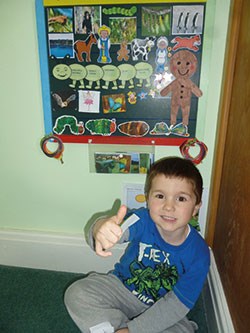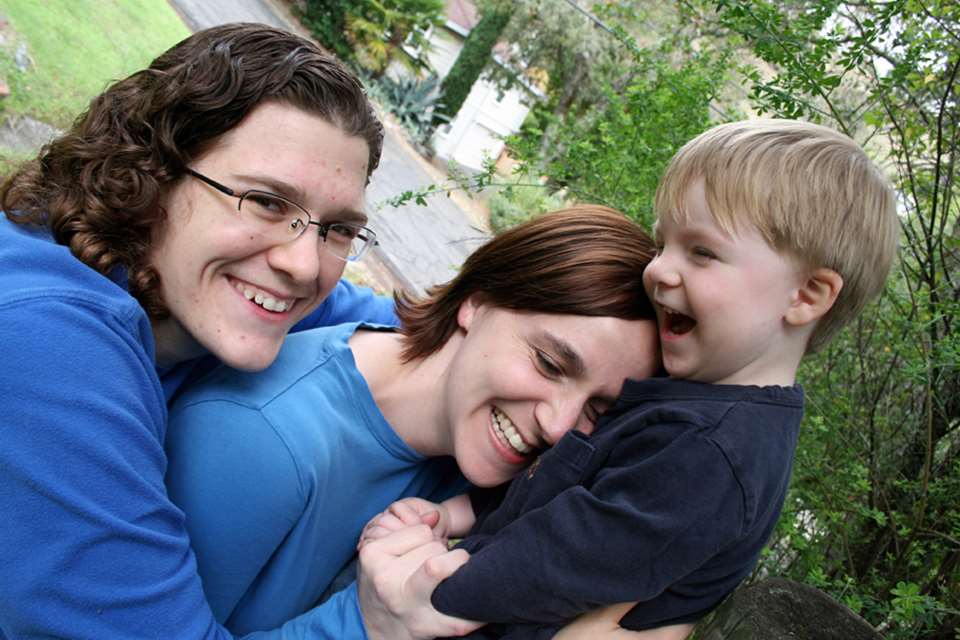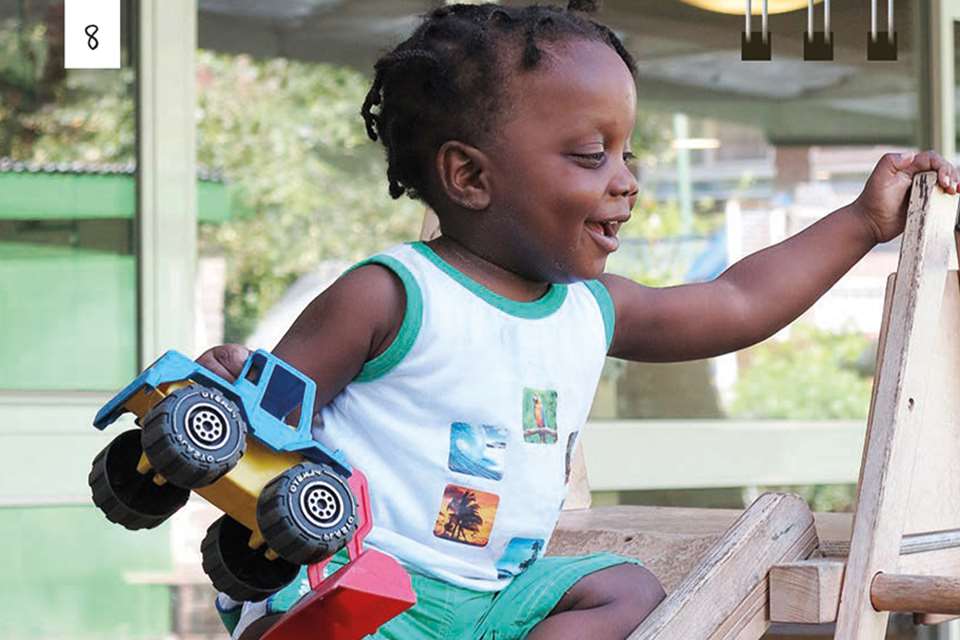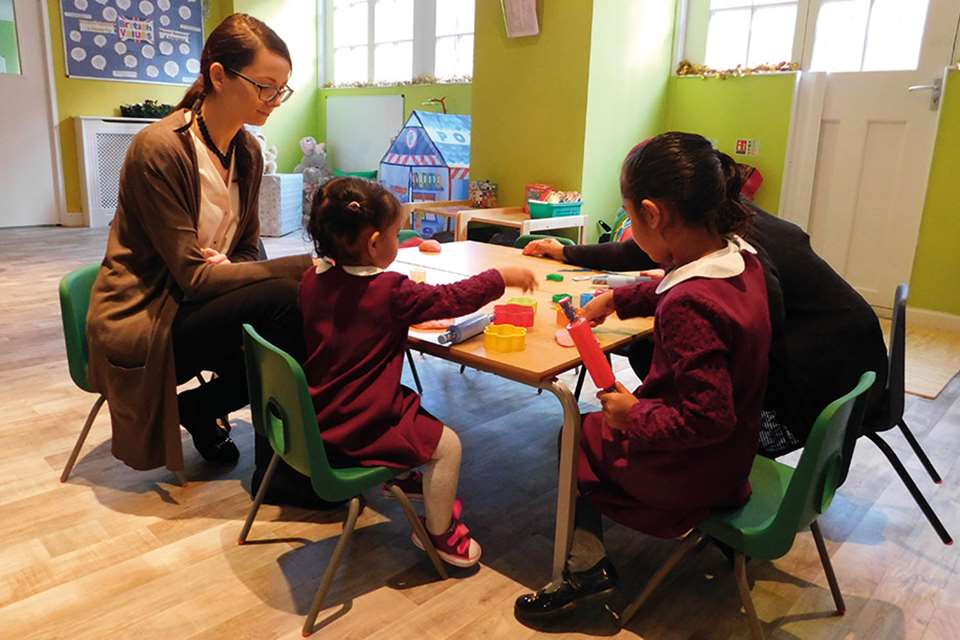Positive Relationships: Working With Parents - Day by day
Kelly Burgoyne, Rachel Gardner, Helen Whiteley and Charles Hulme
Monday, July 24, 2017
Parents and Children Together (PACT), a new parent-delivered teaching programme, has led to gains in children’s early language and reading skills. Kelly Burgoyne, Rachel Gardner, Helen Whiteley and Charles Hulme report on the project

Language and communication skills are central areas of learning and development in the early years and provide the foundations for academic success in school. Finding ways to support early language development before children start school is, therefore, essential, especially in the case of children from socially disadvantaged backgrounds whose communication skills are often weak.
With parents as their child’s first educators, parent-teaching programmes might appear the obvious way to support children’s early language. However, there is little conclusive evidence as yet about their efficacy. One such language programme that has produced positive outcomes is Parents and Children Together (PACT), developed and evaluated by researchers at University College London and the University of Oxford.
PACT is designed to be delivered by parents to their pre-school child in daily 20-minute sessions at home. Running over 30 weeks, the programme is divided into six five-week teaching ‘blocks’, with each block linked to a common early years theme, such as ‘Animals’, ‘The World Around Us’ and ‘Places and People’.
Activities are based on a series of appealing books that incorporate traditional stories (such as ‘The Gingerbread Man’), well-known modern stories (including The Gruffalo), factual books (such as The Pond, published by Usborne) and popular books that may be less familiar to some families (such as Jill Murphy’s Five Minutes Peace). Common to all the books is a strong narrative, engaging and detailed pictures, and interesting content for pre-school-aged children.
STRUCTURE AND ROUTINE
Each week throughout the programme, families receive a book to use in the daily 20-minute sessions. The sessions follow a consistent structure and routine and target language development through interactive reading, direct vocabulary teaching, and work on narrative (story telling skills).
Introduction (two minutes)
The brief introduction is designed to settle the child and get them ready to focus on the activities. This might include turning off the television and mobile phones to avoid distractions, finding somewhere comfortable to sit together, and explaining it is ‘PACT time’ to signal to the child that they are about to start their special activities.
Interactive reading (five minutes)
Parents read the book with their child and encourage them to explore, talk and engage in conversations about it. This is achieved by using suggested prompts and strategies, such as asking questions, pointing to pictures and linking the story to their child’s experiences.
Vocabulary (five minutes)
Direct teaching of specific vocabulary aims to support the learning of new words and encourage children to build connections between words. One new word is taught each day. These appear in or are related to the book or theme, are deemed useful across different contexts and include a range of word types (nouns, adjectives, verbs and prepositions).
Teaching activities support the learning of the new word in the context of the book, and more generally (see box). They emphasise multiple encounters with new words, visual supports for learning, and learning through doing.
Narrative (five minutes)
The book is revisited for work on narrative and extended language skills. Teaching activities include sequencing pictures from the story (beginning, middle and end), developing sentences that summarise the picture or part of the story, and retelling stories using sequenced pictures and sentences and character cards.
Review (three minutes)
New learning is reviewed and the child is praised for their hard work and awarded a sticker.
EVALUATION
Twenty-two children’s centres in three local authorities took part in the evaluation: ten in Blackpool and 12 in London (ten in Bexley; two in Lambeth). Blackpool and Lambeth rank highly on indices of deprivation, and while Bexley is in general less economically deprived, there are significant concentrations of deprivation in this borough.
Invited to take part in the trial were parents with a child aged around three years old and whose main home language was English – 208 families signed up to take part and they proved to be a very diverse group of children and parents:
The children were aged between two years seven months and three years six months at the start of the study.
Some (16 per cent) were growing up with more than one language at home.
Some had language skills at or above the level expected for their age while others showed poorer ability. Around one fifth had significant language weaknesses.
Parents were an equally diverse group; for example, 35.5 per cent of parents had left school aged 16 or younger, while 20 per cent had continued education beyond the age of 21.
The effects of the programme were evaluated using a randomised controlled trial, with one randomly assigned group of parents receiving the language programme and the other group a programme for developing early movement and self-care. The movement programme also involved daily 20-minute sessions over 30 weeks, which meant that any effects of the language programme could be attributed to the content of the teaching, rather than to the extra attention parents paid to their children.
Research staff trained parents to deliver their assigned programme, with small-group training sessions held in the children’s centres and lasting around 1.5 hours. During the programme, parents were supported by children’s centre staff and received a £10 voucher after completing each ten-week block of teaching.
 RESULTS
RESULTS
Parents of 183 children attended training and started the teaching programmes. Some were lost over the course of the study due to factors such as ill-health and moving out of the area, but we were able to follow 159 children to the end of the project.
We found that some parents had delivered none of the programme while others had delivered all 30 weeks. On average, parents in the language group delivered 17 weeks, while parents in the motor skills group delivered 15 weeks. Importantly, there were no significant differences between the two groups in the number of weeks delivered or number of children lost to the project.
To establish whether PACT had led to greater gains in children’s language and narrative skills than the movement programme, we assessed all the children three times: before they started the programmes, immediately after the 30 weeks of teaching, and six months later (at which point children had started school). At each point, children were asked to complete a range of assessments which examined their language abilities (tests measuring vocabulary, grammar and listening comprehension), and narrative skills.
There were no differences between the two groups of children at the start of the study. After 30 weeks, children in the language group had made significantly more progress in their language and narrative skills than those receiving the motor skills programme. Six months later, the language group still showed significantly better language skills, though there were no differences in narrative skills at this time. We also assessed children’s early reading abilities when we saw them in school: children in the language group knew more letter sounds and were able to read more regularly spelled words than children who had received the motor skills programme.
CONCLUSIONS
Our study shows the PACT parent-delivered language teaching programme leads to gains in pre-school children’s early language skills as well as improvements in early reading skills assessed just after school entry. Feedback from the parents was also extremely positive (see box).
We need to conduct further studies to confirm these findings and to evaluate the effect of the programme over a longer period of time. We are in discussions about publishing the language programme, and planning further studies to evaluate its effects.
The PACT project team includes Kelly Burgoyne (University College London), Rachel Gardner (University College London), Helen Whiteley and Charles Hulme (University of Oxford). The study was supported by a grant from the Nuffield Foundation. For more information, see www.ucl.ac.uk/cllg or contact Kelly Burgoyne at: k.burgoyne@ucl.ac.uk
PARENT FEEDBACK
‘He has really loved the first two weeks of the course and loves our PACT time together’
‘[Child’s name] really enjoys it and we have found it easy to follow. She has really improved in some areas already.’
‘This experience has really helped him to develop [an] interest in reading and listening.’
‘Myself and [child’s name] have had hours of fun doing our PACT time together.’
VOCABULARY ACTIVITY: EXAMPLE
Play the farm animals game:
Show your child the farm scene and explain that Old MacDonald lives on this farm but he has lost his animals.
Cut out the animal cards and show them to your child. Say that together you are going to put his animals back on the farm. Name each of the animal pictures with your child.
As you put the animals on the farm, sing the rhyme ‘Old MacDonald’ together, using each of the animals in turn as follows: ‘Old MacDonald has a farm, ee I ee I O. ‘And on that farm he has a [pig]. With an [oink, oink] here, and an [oink, oink] there, here an [oink], there an [oink], everywhere an [oink, oink]. ‘Old MacDonald has a farm, ee I ee I O.’
MORE INFORMATION
Child First, www.childfirst.org
Early Intervention Foundation, www.eif.org.uk
Family Foundations, http://famfound.net
Family Nurse Partnership, http://fnp.nhs.uk









